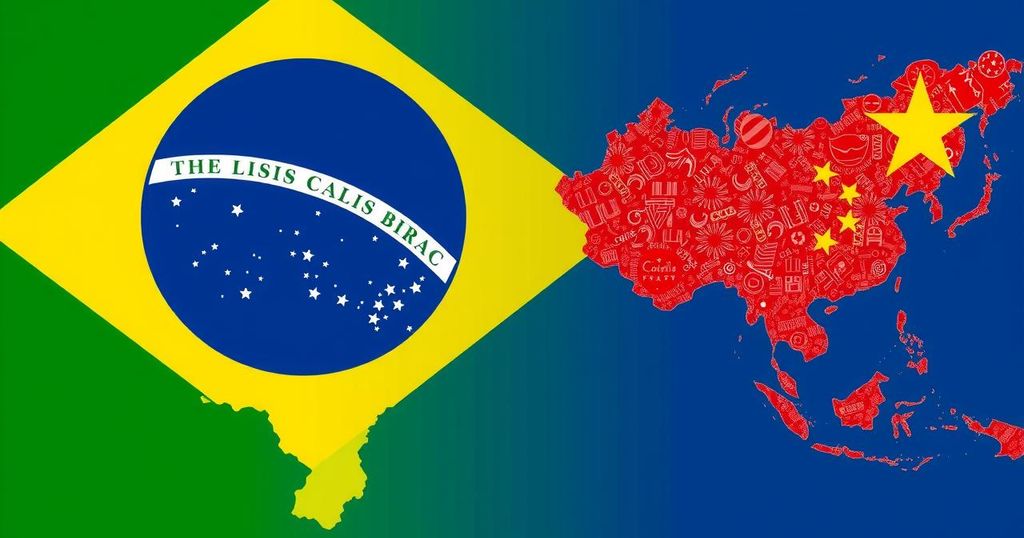Brazil’s role within BRICS faces potential dilution as the group expands its membership, including countries such as Egypt, Ethiopia, Iran, and the UAE. While historically a prominent member, Brazil seeks to assert its influence by opposing Venezuela’s inclusion and promoting democratic tenets. As it prepares to assume the BRICS presidency next year, Brazil aims to navigate its relationships and aspirations amid complex geopolitical dynamics.
Brazil, as a founding member of the BRICS group, finds itself at a critical juncture as the coalition expands, potentially diluting its influence on the global stage. Historically, Brazil held a position of importance within BRICS, but recent developments may alter this dynamic. The recent accession of four countries—Egypt, Ethiopia, Iran, and the United Arab Emirates—in January signifies a significant growth for BRICS, countering Brazil’s long-held advantage of a relatively exclusive member status. With more nations expressing interest in joining, including Cuba and Bolivia, Brazil’s predominance within the group could further wane. Efforts to broaden BRICS have been driven by China, which seeks to increase its global influence. The emerging preference among some nations for non-dollar currency transactions, especially given the context of Western sanctions on Russia, has made the group more appealing. The unfolding scenario, however, is complicated by geopolitical tensions, particularly with the inclusion of Iran and its implications for Brazil’s public neutrality in international relations. As Jorge Heine and Ariel González Levaggi noted, “At present, the group is torn. China and Russia would like to build it into an anti-Western entity, while Brazil, India, and South Africa would prefer it to take a stance closer to nonalignment.” During the recent BRICS summit in Kazan, Brazil attempted to reaffirm its influence by advocating against Venezuela’s inclusion as a partner country, a move that aligns with Brazil’s foreign policy under President Luiz Inácio Lula da Silva. The exclusion of Venezuelan President Nicolás Maduro was a significant gesture, reflective of Brazil’s careful navigation of its regional diplomatic posture. As political analysts pointed out, Brazil’s approach seeks to cautiously endorse democratic progress in Venezuela rather than cling to outdated alliances. Furthermore, Brazil, under the leadership of President Lula, is poised to assume the BRICS presidency next year, providing it with an opportunity to shape the group’s agenda further. On the financial front, Brazil’s former President Dilma Rousseff continues to receive endorsement from BRICS to lead the New Development Bank, marking a strategic focus on diversifying financial transactions away from the dollar, albeit progress remains slow. This period of expansion presents Brazil with both challenges and opportunities as it endeavors to maintain its status within an increasingly complex global framework, while ensuring that it stays true to its national interests and cooperative regional aspirations.
Brazil, one of the original members of the BRICS grouping, has historically enjoyed a privileged status within the coalition. However, as the group expands to include new members, Brazil’s relative influence is at risk. The ongoing geopolitical shifts, particularly due to China’s push for broader BRICS participation and the issue of economic sanctions on Russia, have contributed to Brazil’s reassessment of its role. Moreover, with an increase in the number of countries interested in BRICS partnership, Brazil must navigate its own diplomatic relationships within this evolving landscape, maintaining its foundational goals while addressing evolving alliances and regional dynamics. Brazil’s foreign policy has also adapted to assert its position, specifically regarding relationships with nations like Venezuela.
In conclusion, Brazil’s position within the expanding BRICS framework exemplifies a pivotal moment for the country as it strives to hold on to its influence amidst increasing membership and geopolitical complexities. The strategic maneuvers taken by Brazil in relation to the inclusion of other countries, particularly Venezuela, underscore its commitment to long-term democratic values while concurrently navigating its interests in a rapidly changing international environment. Looking forward, Brazil’s upcoming presidency of BRICS provides a critical opportunity to shape the group’s agenda in a manner aligned with its objectives, particularly in pursuing diversified financial systems that reduce dependency on the dollar.
Original Source: foreignpolicy.com






